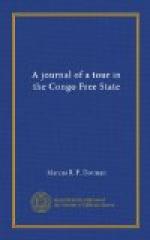At Irebu, the narrow river from Lake Tumba joins the Congo, and from its small size is known usually as the canal. The current sometimes flows up and sometimes down, according to the height of water in the Congo, but it is obvious that the general direction must be down, as many small streams flow into the Lake, and all their water is certainly not dispersed by evaporation. Many crocodiles pass up and down the canal and it would be easy to shoot them from the windows or verandah of my house, but it seems to be rather a waste of cartridges which, like most other things, must be carried the whole tour, for none can be procured in the Congo. I do not therefore, care to run the risk of running short when the hunting grounds of Uele are reached.
Sunday is usually a very busy day in Irebu. No work is done, but all the Chiefs come in to call on the Commandant, who is evidently regarded as a species of parent. Indeed, the nickname of Commandant Jeniaux is the native word meaning Father. All the sick are brought in and receive treatment; children are vaccinated, and any little native disputes are brought before him to settle. These nearly always relate to women. One man will complain that his wife has not behaved herself properly at home, that she has not prepared his food nicely, or much more rarely, that she has run away with another. Sometimes a Chief complains that another one has stolen some of his women or goats, and then the other side is heard and the judgment pronounced. These are of course, not formal trials, and the judgment is more in the shape of advice. It is however, always acted upon, for the time being at least. Serious cases are left to the Courts, but this institution of friendly palavers is an excellent one and establishes confidence and good will among the natives. It is here indeed, that the personal character of the white man is put to the test. A calm, just, firm rule will win both the love and respect of these over-grown children, but an excitable, harsh, uncertain temper and manner, will only awaken distrust and hatred. The more popular the head of the Station, the easier it is for him to find workers in the villages, which in turn affect the general condition of the country around. Although the system of work is absolutely uniform and every official is tied in a particular groove, yet the whole welfare, work, and indeed, appearance of the country and villages, is good or bad according to the moral character and personality of the chief white man in the neighbourhood. I would therefore, say, with however some reserve, that when the natives are discontented and rebel, it is not because they dislike the system of Government, but are dissatisfied with the man who administers it.
[Illustration: NATIVE CHIEFS AT COQUILHATVILLE.]
On August 16th, Inspecteur d’Etat Warnant, Commander in-chief of the Force Publique, arrives at Irebu. He is on a tour of inspection, and has every reason to be satisfied with the efficiency of the troops. Perfect discipline and harmony is maintained throughout all ranks and all the officers are agreed that the troops are perfectly steady when fighting and never show the least sign of cowardice. Many are very good shots and their drill certainly leaves nothing to be desired.




